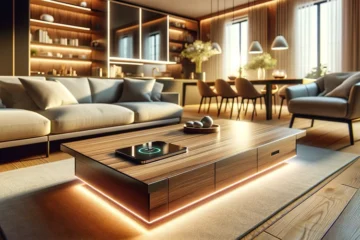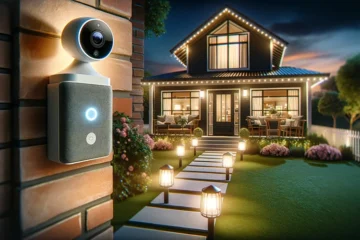Smart Locks and Home Access Control Systems

Ever found yourself wondering if there was a more secure, convenient way to manage access to your home? Imagine if you could control who comes and goes, all from the palm of your hand. Enter the world of smart locks and home access control systems. These technological marvels are not just about ditching traditional keys; they’re about enhancing security and bringing your home into the digital age. Ready to learn how they can transform your living space?
The Evolution of Home Security: From Keys to Keypads
Home security has come a long way. We’ve transitioned from traditional lock-and-key systems to digital keypads, and now, to smart locks. These devices offer a blend of convenience and security, allowing homeowners to unlock doors with smartphones, codes, or even biometrics.
Understanding Smart Locks
Smart locks are electronic devices that control access to your home without a traditional key. They connect to your home’s Wi-Fi or Bluetooth, enabling remote access. You can lock and unlock your door, grant temporary access to guests, and receive alerts—all from your smartphone.
Benefits of Smart Locks
- Enhanced Security: With features like encrypted signals and built-in alarms, smart locks provide a higher level of security.
- Convenience: Forget fumbling for keys. Your phone becomes your key, offering easy access to your home.
- Access Control: Grant or revoke access at any time. Perfect for letting in house sitters, deliveries, or guests.
Choosing the Right Smart Lock
When selecting a smart lock, consider compatibility with your home’s existing hardware, connectivity options (Wi-Fi, Bluetooth, Z-Wave), and whether it integrates with your current smart home ecosystem.
Exploring Home Access Control Systems
Beyond smart locks, comprehensive home access control systems provide an additional layer of security. These systems can include intercoms, gate controls, and even facial recognition technology, offering a fully integrated security solution for your property.
Components of a Home Access Control System
Home access control systems might consist of several components, depending on your needs:
- Electronic locks
- Video intercoms
- Gate control mechanisms
- Security cameras
Helpful Hint:
When planning your home access control system, think about future scalability. Choosing a system that can easily integrate additional components will save you time and money down the line.
The Integration of Smart Home Ecosystems
Integrating your smart locks and home access control systems with a broader smart home ecosystem can streamline security and convenience. Imagine controlling lights, thermostats, and locks all from one app. Compatibility with voice assistants like Amazon Alexa or Google Assistant adds another layer of convenience.
Stats:
A recent survey found that over 70% of homeowners value the ability to monitor their home remotely, with many opting for smart locks as a primary way to achieve this.
Installation and Maintenance of Smart Locks
Installing a smart lock is generally straightforward, with many models designed to fit existing door setups. However, professional installation might be necessary for more complex systems. Maintenance typically involves updating software, replacing batteries, and occasional troubleshooting.
DIY vs. Professional Installation
While many smart locks are designed for DIY installation, complex systems or integration with existing home security systems may require professional help. Consider your technical skills and the complexity of your system before deciding.
Continuing from where we left off, let’s delve deeper into the capabilities of smart locks and home access control systems, focusing on advanced features, user experiences, and their impact on modern home security.
Advanced Features of Smart Locks
Today’s smart locks go beyond basic functionality, offering features that enhance security and user convenience. For instance, geofencing allows your lock to automatically secure when you leave a certain area. Biometric access, using fingerprints or facial recognition, adds a personal layer of security, making unauthorized access nearly impossible.
Geofencing and Auto-Locking
With geofencing, your smart lock can detect when you’re approaching or leaving your home, locking or unlocking the door accordingly. This feature ensures you never forget to secure your home again.
Biometric Access
Biometric smart locks use unique physical characteristics, like your fingerprint, for access. This means no more worrying about lost keys or forgotten codes. Your entry is as simple as a touch.
Helpful Hint:
When considering a biometric smart lock, look for models that store data securely and offer alternative entry methods in case of technology failures.
User Experience and Accessibility

The success of smart locks and home access control systems hinges on their user experience. Manufacturers prioritize intuitive apps and devices that all family members can use, regardless of tech savvy. Accessibility features, such as voice commands and tactile buttons, ensure that everyone, including those with disabilities, can operate these systems.
Integration Challenges and Solutions
Integrating smart locks into existing home security systems can pose challenges. Compatibility issues may arise, but many manufacturers offer bridge devices to connect different technologies. Customer support and detailed guides are also invaluable resources for troubleshooting.
Stats:
An estimated 60% of users find smart lock apps to be more convenient than traditional keys, with a significant portion appreciating the ability to grant remote access to visitors.
The Role of Smart Locks in Modern Home Security
Smart locks and access control systems are becoming central to modern home security strategies. They offer not just convenience but also a significant enhancement in security levels. Real-time alerts, activity logs, and the ability to remotely manage access give homeowners unprecedented control over their home security.
Combining Traditional and Smart Security Measures
While smart locks provide advanced security features, they work best as part of a comprehensive security approach. Combining them with traditional measures, like deadbolts and security cameras, offers a robust defense against potential intruders.
Future Trends in Home Access Control
The future of home access control looks promising, with advancements leaning towards even greater integration and intelligence. We’re seeing a shift towards systems that can predict and adapt to your needs, using artificial intelligence to learn from your habits and preferences. Imagine a home that unlocks itself as you approach, adjusts the temperature to your liking, and even notifies you if you’ve left a window open.
AI and Machine Learning in Smart Locks
Artificial intelligence (AI) and machine learning are set to revolutionize how smart locks operate. Future models could automatically adjust security settings based on your routine, detect unusual activity, and even integrate with home security systems to provide a comprehensive security solution.
Increased Integration with Smart Home Devices
The integration of smart locks with other smart home devices is expected to deepen, offering a seamless, holistic smart home experience. This includes more sophisticated voice control, better energy management, and advanced scenarios where access control can trigger other actions, like turning on lights or activating security cameras.
Helpful Hint:
To stay ahead of the curve, look for smart locks and access control systems that offer firmware updates to keep your system compatible with the latest smart home technologies and security standards.
Ensuring Privacy and Security in the Digital Age
As we embrace these advanced technologies, it’s vital to consider the privacy and security implications. The more connected our homes become, the more we need to be vigilant about data protection. Choosing products from reputable manufacturers with strong security protocols is crucial. It’s equally important to regularly update your devices and be aware of the personal information you share.
Best Practices for Digital Security
To protect your home and personal data, adopt best practices for digital security. This includes using strong, unique passwords for your devices and networks, enabling two-factor authentication where available, and being cautious about which third-party services you connect to your smart home system.
FAQs
Bottom Line
Smart locks and home access control systems represent the next step in home security. They blend convenience with robust security features, offering homeowners a new level of control. By understanding the options, benefits, and considerations, you can make an informed decision about integrating these technologies into your home. Remember, the goal is not just to adopt new technology for its own sake but to enhance the security and functionality of your living space. Smart locks and access control systems are more than gadgets; they are tools that, when used correctly, can significantly improve your quality of life and peace of mind.


